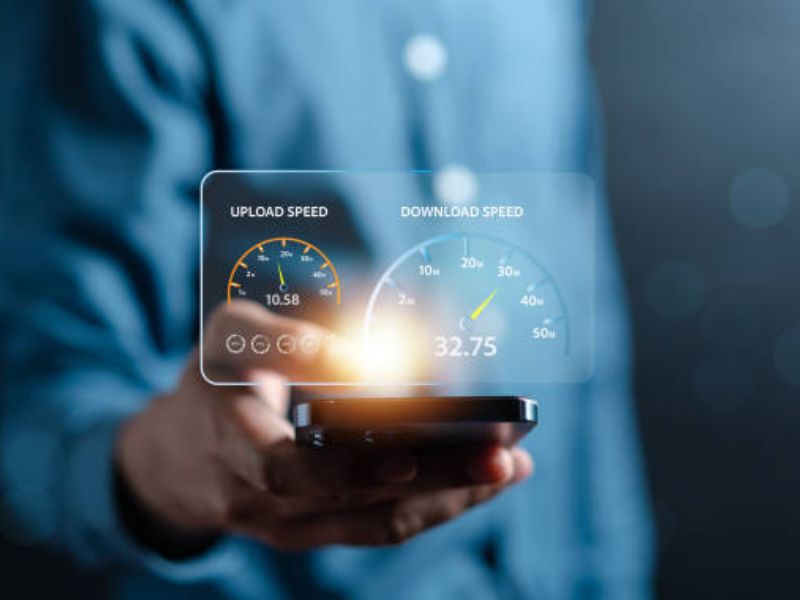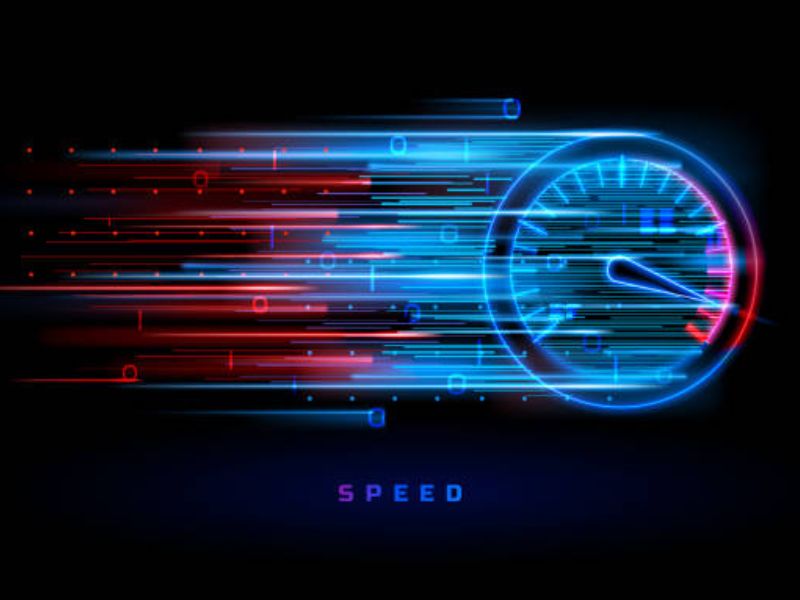In the digital tapestry of today’s world, where data travels like whispers on the wind, the quest for the fastest internet speed is akin to the fabled race between the tortoise and the hare. Yet, in this modern iteration, hares abound, and they streak across the globe in beams of light, carrying information at mind-boggling speeds. Cities and countries vie for the top spot on this leaderboard, turning once humble internet connections into veritable data superhighways. These electron autobahns glisten with the promise of near-instantaneous access to knowledge, entertainment, and communication, knitting together far-flung corners of the globe with silken threads of connectivity.
Imagine the sheer exhilaration of downloading entire libraries in the blink of an eye or streaming the highest-definition videos without a hint of buffering. This is the reality in the enclaves where the internet races at the speed of light, unfettered by the friction of outdated technology.
Unleashing Internet Speed: How Fast Can It Go?
Navigate through the digital landscape, where data races along at varying velocities. Imagine Mbps as gentle streams of data, Gbps as roaring rivers, and Tbps as colossal tidal waves of information cascading through the fibers of the network. Amid this rush, the role of Ping and Latency emerges as the rhythmic heartbeat and reflex of the network’s responsiveness, a dance of signals that dictate how swiftly data reaches its destination. Grasp the essence of Speedtest, a technological oracle that unveils the swiftness of data transfer, offering a glimpse into the potential of our connected world, always on the brink of reaching new, breathtaking horizons of rapid exchange.
The Difference Between Mbps, Gbps, and Tbps
Sailing from the harbor of basic understanding, we venture into the vast ocean of data rate measurements, where different units of measure flutter like flags on a breezy day, signaling the capacity of our digital vessel. Imagine megabits, gigabits, and terabits as waves of varying sizes: the humble megabit, a gentle ripple caressing the shores of everyday online browsing; the mighty gigabit, a robust wave powering through to deliver streaming of ultra-high-definition videos without a stutter; and the colossal terabit, a towering tsunami of data, capable of submerging cities in a sea of simultaneous downloads, uploads, and colossal cloud-based computations.
Each jump from one bit scale to the next signifies a tenfold surge in the volume of data coursing through the veins of our cyber-world every second. Just as a bucket brigade might graduate from cups to buckets to barrels in fighting a blaze, so too does our infrastructure evolve to harness these ever-burgeoning tides of digital information.
The Role of Ping and Latency in Internet Speed
As we navigate through the intricacies of our online experiences, it’s essential to shed light on the responsiveness of our digital connections. Imagine the digital realm as a vast ocean, where data packets are like ships sailing from one port to another. The time it takes for these ships to reach their destination and return is akin to the responsiveness of your connection, often referred to as ‘ping’ in common parlance.
This responsiveness, or the delay before a transfer of data begins following an instruction for its transfer, can dramatically color the quality of online interactions. Picture yourself in an intense online gaming session, where every millisecond is a battle between triumph and defeat. Here, a high delay can mean the difference between a victorious strike and a frustrating defeat.
The smoothness of streaming your favorite live concert also hinges on this crucial factor. A lower delay ensures that the music flows to you in real time, allowing you to bask in every note as if you were there in the crowd, with the stage lights glinting before your eyes.
Understanding the Technology Behind Speedtest
Galloping through the digital landscape, one might wonder how the agility of their online connection is gauged. Delving into the mechanics of these virtual velocity measurements, a fascinating process unfolds, far from the ordinary eye. Envision a sophisticated set of algorithms that function like digital stopwatches, meticulously timing the journey of data packets as they vault from your device to a remote server and back again.
This chronometer does more than just tick; it scrutinizes the quality of the data thoroughfare by analyzing the transfer rates and stability of the connection. It offers a snapshot, a fleeting glimpse, into the robustness of the pathway that data travels. Imagine a virtual autobahn where these packets are the vehicles, and this technology is the traffic helicopter, hovering above, monitoring their flow, their swiftness, and the smoothness of their ride.
It is not the raw pace alone that is chronicled but the consistency and reliability of the data conduit, painting a vivid tableau of how efficiently the digital realm is navigated.

World’s Fastest Internet: Top Countries Leading the Race
In the digital realm, South Korea emerges as a colossus, with its ultra-fast broadband capabilities, setting a global benchmark. Not far behind, Japan and Singapore unfurl their connectivity prowess, boasting impressive, swift data highways that empower a seamless digital experience. Venturing north, the Scandinavian trio—Sweden, Denmark, and Norway—each weave a tapestry of high-performance networks. These northern stars shimmer with robust digital infrastructure, ensuring that the data flows like the pristine, icy rivers of their homelands. Together, these nations lead a charge towards a future where information travels at the blink of an eye, forging paths in the virtual expanse.
South Korea: The Internet Speed Giant
As we marvel at the strides made in digital velocity, one nation stands as a colossus in the realm of online connectivity. The Land of the Morning Calm, with its technological prowess, has firmly established dominance, crafting a new benchmark for the rest of the world.
In this Asian powerhouse, web pages load in the blink of an eye and high-definition videos stream without a hint of buffering. The secret lies in the nation’s commitment to innovation and infrastructure, leading to a seamless digital experience that is envied globally. Here, bustling cities are woven with a tapestry of fiber-optic cables, ensuring that even during peak hours, the virtual landscape remains as fluid as the Han River.
E-sports athletes and tech-savvy entrepreneurs alike bask in this haven of hyper-connectivity, where digital life progresses unhindered by the shackles of slow downloads or uploads. This country has not only kept up with the times but leapfrogged into the future, setting a gold standard for what it means to be truly connected.
Japan and Singapore: The Asian Internet Titans
As we glide through the realms of digital velocity, let’s steer our gaze towards the Asian powerhouses renowned for their rapid online connectivity. The Land of the Rising Sun and the Lion City stand as formidable champions in the global race for network supremacy.
The archipelago nation, famed for its technological innovations and cherry blossoms, boasts an impressive web infrastructure. With bustling cities like Tokyo and Osaka, the data flows as seamlessly as the bullet trains slicing through the countryside. Here, the electronic pulse thrives, enabling a multitude of businesses and entertainment industries to flourish under the neon glow.
Crossing the sea to the tropical haven known for its pristine streets and futuristic skyline, the Lion City roars with equally astonishing digital prowess. This compact metropolis has become a sanctuary for data centers, with a robust framework that interlaces the entire island. Citizens and visitors alike revel in the seamless connectivity that powers everything from financial transactions to streaming culinary adventures in hawker centers.
Together, these nations embody the cutting-edge of a connected world, setting benchmarks for others to aspire to.
The Scandinavian Trio: Sweden, Denmark, and Norway
As we sail through the digital waves towards the northern stars, a trio of Scandinavian gems shines brightly, setting an example in the realm of ultra-fast online connectivity. Sweden, Denmark, and Norway emerge as champions, their digital infrastructure a testament to the Nordic commitment to efficiency and quality of life.
In Sweden, the digital landscape stretches out like the vast, serene forests that dot the countryside, offering seamless online access that rivals the purity of its natural springs. Here, residents enjoy a virtual banquet of connectivity that allows for an uninterrupted flow of data, as essential to their daily lives as the midnight sun.
Denmark’s approach to cyberspace is as meticulous as their renowned design tradition, fostering an environment where every byte of data flows with the precision of a well-oiled machine. The Danish digital experience is akin to a perfectly crafted Lego set, where every piece clicks together in harmony.
Norway’s rugged fjords are mirrored in their robust online infrastructure, where connectivity courses through the nation like the powerful waterfalls that carve the landscape.
Top Internet Service Providers: Who Provides the Fastest Internet?
Comcast stands tall as a colossus in digital connectivity, weaving a web of ultra-responsive service across vast landscapes. As the journey through the virtual realm continues, one encounters the formidable alliance of Verizon and AT&T, their offerings a harmonious blend of swift and steadfast data streams. On the horizon rises Google Fiber, a beacon of innovation, dazzling with its promise of revolutionary quickness in digital exchanges. Not far behind, Spectrum emerges, its tendrils of connectivity casting a wide net, ensuring that every byte and bit glide with ease and grace through the arteries of the modern world.
Comcast: A Leader in Internet Services
As we glide from a global perspective to a closer look at individual providers, one company stands out as a beacon of connectivity, offering services that keep countless users happily surfing the digital waves. This leader in the realm of online access has established itself as a household name, ensuring that families and businesses alike are linked to the world with a reliable and rapid flow of data.
This provider, known for its signature Xfinity service, has consistently pushed the boundaries of what consumers expect from their online experience. With a keen focus on delivering not just fast but also stable and expansive coverage, they have woven a network that blankets entire neighborhoods, cities, and beyond, with a comforting embrace of connectivity. This tapestry of data channels allows seamless streaming, effortless browsing, and uninterrupted virtual engagement, which has become the lifeblood of modern existence.
Their commitment to enhancing user experiences is evident in their dedication to upgrading infrastructure and investing in cutting-edge technology, ensuring that the digital pulse of society beats strong and steady.
Verizon and AT&T: Speed and Service Combined
While the quest for the swiftest online connectivity propels nations forward, it is the service providers that weave the web of ultra-fast digital highways. Among the frontrunners, two names stand out for their harmonious blend of rapid data transfer rates and commendable customer care: a pair of American telecommunications giants.
These industry titans extend their reach across vast landscapes, offering a fusion of reliability and velocity that caters to the insatiable appetite for streaming, gaming, and browsing. One, with its iconic red checkmark, has become synonymous with a network that spans from bustling metropolises to serene suburban retreats. Their fiber-optic offerings shine like strands of light, threading through the urban fabric, delivering crystal-clear connections that make virtual meetings feel like face-to-face encounters.
The other, donning blue, matches its counterpart in the race, with a robust infrastructure that promises uninterrupted access to the digital realm.
The Rise of Google Fiber and Spectrum
As we marvel at the nations sprinting ahead in the global connectivity marathon, let’s pivot to the corporate titans that are reshaping the landscape of online access. Within this dynamic arena, two names are gaining momentum with their innovative offerings: the tech giant’s broadband service and the vibrant entrant, Charter Communications’ digital solution.
The tech giant’s broadband service, with its promise of crystalline clarity and rapid-fire data transmission, has emerged as a beacon of progress. This service glides into communities, leaving a trail of fiber-optic brilliance that promises to elevate the online experience to new heights of reliability and excellence. Cities touched by this service find themselves at the forefront of a connectivity renaissance, where buffering wheels become relics of the past.
Meanwhile, Charter Communications’ digital solution has woven a tapestry of connectivity across the nation, with threads of flexibility and customer satisfaction interlaced throughout its offering.

The Technology Behind the Speed: Internet Connectivity Explained
Eager to delve into the marvels of modern connectivity, one must first consider the brilliance of Fiber Optic technology, a beacon of high-capacity data transmission, illuminating pathways with pulses of light. As the world dances into a wireless embrace, 5G emerges as the next frontier, promising a tapestry of ultra-quick links connecting the global village. Yet, the landscape is diverse; Satellite beams conversations and knowledge from the heavens, casting a wider net, albeit with a gentle caress. Meanwhile, DSL whispers through copper wires, an enduring testament to traditional infrastructure, steadfast but facing the twilight of its era.
The Power of Fiber Optic Internet
As we navigate from the bustling digital highways where top service providers compete, imagine diving into the ocean’s depths where light travels through glass with remarkable clarity. Here, in the realm of fiber optics, data zips through thin, lustrous strands, harnessing the power of light to deliver a world of information at breathtaking pace.
These glass fibers, no thicker than a human hair, carry beams of light over vast distances with minimal signal loss, making them the arteries of the high-speed data realm. The brilliance of this technology lies in its capacity to transmit vast volumes of data simultaneously, akin to a symphony orchestra playing in perfect harmony, resulting in an unparalleled, seamless online experience.
In the bustling metropolis of the digital age, these fibers are the unsung heroes, lying beneath the urban sprawl and stretching across the seabed, connecting continents with the flicker of photons.
5G: The Future of Internet Speed
As we navigate the digital seas, a new wave of connectivity is cresting on the horizon, promising to revolutionize our online experiences. This future is not tethered by wires or cables; instead, it rides the airwaves with a grace that turns previous limitations into a distant memory.
Imagine a world where the flow of data resembles a symphony of light, darting through the atmosphere. This next-generation wireless technology is a beacon for seamless streaming, ultra-responsive downloads, and a realm where buffering icons become quaint relics of the past. It harnesses a spectrum of frequencies that transforms urban jungles and sprawling landscapes into arenas of unparalleled digital harmony.
This technology is not merely an incremental step forward; it is a quantum leap that will usher in an era of smart cities, autonomous vehicles, and immersive virtual realities. It is the harbinger of untethered innovation, where connectivity is as ubiquitous as the air we breathe – a true game-changer in the digital symphony of our lives.
Comparing Broadband, Satellite, and DSL Internet Services
Sailing across the digital ocean, our voyage takes us from the bustling harbors of top service providers to the underlying currents that carry our data. Imagine the vast network as a constellation of pathways, each offering a unique journey from source to destination.
Broadband, the digital highway often preferred for its robust and reliable connection, is akin to a wide river with a strong current, propelling an abundance of information with ease and grace. Users along the riverbanks enjoy a steady flow of data, ideal for streaming, gaming, and downloading large files, without interruption.
In contrast, think of satellite connections as messengers of the sky, beams of data sent to orbit and back. This celestial route is remarkable for reaching the most remote of locations, where terrestrial cables dare not tread. However, the atmospheric journey can be fickle, with weather and obstructions sometimes scattering the messages like leaves in a storm.
Lastly, there’s the older, winding paths of DSL.

Breaking Records: The Fastest Internet Speeds Ever Recorded
In a realm where digital connections are akin to the lifeblood of modern civilization, a new pinnacle of data transfer rates has been etched in the annals of achievement. The World Record for zipping through virtual highways now stands as a testament to human ingenuity. As this Guinness World Record shatters previous barriers, it’s the product of meticulous Lab Tests, where Research teams converge in their quest for excellence. Within the controlled chaos of laboratories, Experiments serve as crucibles for innovation, pushing the limits of how swiftly and smoothly information can dance across the globe.
The World Record for Internet Speed
As we pivot from the intricate workings of digital connectivity, it’s a moment to behold the breathtaking zenith of data transmission achievements. Imagine a marathon where the runners are bits of data, and the finish line is a record that seems almost mythical in its magnitude. In a display of technological prowess, scientists have shattered previous benchmarks, clocking in a data transfer rate that would make even the most seasoned tech aficionados’ jaws drop.
This unprecedented milestone in data transmission has reshaped perceptions of what’s possible in the realm of network capabilities. Envision a vast, unbridled river of data flowing at a rate that eclipses the collective imagination, setting a new pinnacle of excellence. This feat isn’t just a number; it’s a testament to the relentless pursuit of pushing the boundaries of connectivity to their absolute limits, charting a course for future innovations that will one day become the norm.
Guinness World Record: Breaking Internet Speed Barriers
With curiosity now piqued about the marvels of digital connectivity, it’s time to delve into the realm of record-smashing feats in data transmission. Picture a scene where engineers and scientists gather, their eyes alight with anticipation, as they prepare to shatter previous benchmarks for how swiftly vast volumes of information can traverse the invisible pathways that connect our globe.
In this domain, accolades are bestowed, not for physical prowess, but for orchestrating the dance of electrons and photons in a symphony of unparalleled velocity. The hall of fame here isn’t lined with athletes but with innovators who coax the infrastructure of cyberspace to outdo itself, time and again.
Imagine a moment frozen in time, where the culmination of countless hours of fine-tuning and innovation erupts in a crescendo of data transfer that surpasses human imagination. The accolade in question isn’t just a mere title; it’s a testament to human ingenuity, a charter that heralds a new frontier in the annals of digital advancement.
Lab Tests, Research, and Experiments: Pushing the Limits of Speed
As we pivot away from the mechanisms that make our digital lives zip along, let’s dive into the hushed, high-tech laboratories where the future of online connectivity is being forged. Here, in these hubs of innovation, scientists and engineers are tirelessly pushing the boundaries of what’s possible, conjuring up the next breakthroughs that will redefine the velocity at which data travels.
In these playgrounds of discovery, where the air is electric with the hum of cutting-edge machinery, teams engage in a relentless pursuit of excellence. They tinker with new materials and protocols, seeking to shatter previous benchmarks. The meticulous orchestration of trial and error unfolds, with each iteration bringing them closer to breathtaking leaps forward in how quickly information can be transferred across the globe.
The narrative of these endeavors is one of meticulous calculation, imaginative problem-solving, and the occasional Eureka! moment. It’s a testament to human ingenuity, where the limits of connectivity are not seen as barriers, but as challenges to be overcome with a blend of science, technology, and sheer determination.
The Future of Internet Speed: What’s Next?
As digital connections weave even more intricate webs, the anticipation of how they will grow becomes palpable. Crystal-ball gazing into the trajectory of these links hints at a surge in efficiency. Emerging innovations, those twinkling stars on the horizon, promise to revolutionize the way data courses through the virtual veins of our global village. Picture a landscape where the infusion of cutting-edge developments catapults online experiences into uncharted territories. Envision the transformation of digital habits, where augmented velocities alter the very fabric of web interaction, turning today’s dreams into tomorrow’s reality.
Predicting the Evolution of Internet Speed
As humanity strides into a new era, the quest for swifter data transfer continues unabated, painting an electrifying panorama of tomorrow’s connectivity landscape. Envision a time when downloading voluminous data files could be as swift and seamless as a river flowing effortlessly through a grand canyon, transforming the once-mundane experience into a spectacle of efficiency. Forecasters are peering into the crystal ball, suggesting that the evolution of cyberspace transmission rates will soon make today’s benchmarks appear as quaint as a horse-drawn carriage beside a sleek sports car.
The relentless pursuit for acceleration in data exchange is expected to forge ahead with innovations that could dwarf current records, making instantaneous access to high-definition content across the globe a daily reality. Predictions indicate that the dawn of ultra-high-frequency spectrums and sophisticated network protocols will catapult connectivity into realms once thought to be the domain of science fiction. As the horizon of possibilities expands, this digital odyssey promises to unlock doors to an interconnected universe where the sky is no longer the limit.
Upcoming Technology That Could Impact Internet Speed
As the horizon of digital connectivity expands, a shimmering array of innovations looms, promising to catapult data transfer capabilities to dazzling new heights. Picture a tomorrow where the very air crackles with the electricity of unprecedented data exchange rates, brought to life by a vanguard of emergent tech marvels. One such beacon of progress is the evolution of quantum communication networks, which harness the peculiar properties of quantum bits to perform data dances at nearly incomprehensible velocities. Imagine tiny particles entangled across vast distances, sharing information instantaneously in a choreography that defies traditional expectations.
Another trailblazing advance is the development of terahertz frequency bands, where the air itself becomes a superhighway for data, carrying voluminous torrents of information on waves that oscillate trillions of times per second. This could transform urban landscapes into pulsating hubs of seamless data streams, connecting everything from autonomous vehicles to advanced wearable devices with a silken smoothness.
How Will Increased Speed Change Internet Use?
As humanity strides into an era of unprecedented digital velocity, the transformation in how society interacts with the online cosmos is nothing short of revolutionary. Imagine a life where virtual reality becomes indistinguishable from physical reality, as hyper-accelerated data transfer rates enable flawless, real-time immersive experiences. Education will blossom into a garden of interactive, holographic lessons where learners across the globe can congregate in virtual classrooms, sharing knowledge as if seated side by side.
The entertainment industry will be reborn, with films and games streamed in ultra-high definition without the faintest hiccup, creating cinematic adventures that are palpable in their intensity. In the realm of healthcare, lightning-quick connections will allow for instantaneous telemedicine consultations and remote surgeries, making distance irrelevant in the pursuit of medical expertise.
The Impact of Internet Speed on Everyday Life
As the digital landscape unfolds, seamless streaming and responsive gameplay become essential for leisure and recreation, with fluid connectivity underpinning the joy and immersion in fantastical worlds. Transitioning into the professional sphere, a swift online presence propels productivity, allowing commerce and creativity to flourish without the shackles of buffering symbols. In the realm of dialogue and community, the velocity of data exchange breathes life into Social Media platforms, enabling vibrant conversations that span the globe in the blink of an eye, knitting together a tapestry of instant, interconnected human experiences.
How Internet Speed Affects Entertainment and Gaming
As we navigate through the digital river, it’s clear that the flow of data has become the lifeblood of our leisure activities, particularly in the realms of interactive play and multimedia enjoyment. Imagine this: screens come alive with vivid, uninterrupted scenes, each frame a brushstroke of pixels painting a smooth narrative. Players across the globe engage in virtual environments with such seamlessness that distance becomes a mere illusion.
In these digital playgrounds, heightened data transfer rates allow for immersive experiences that rival reality, where fantasy worlds are rendered in exquisite detail and online multiplayer battles unfold with the precision of a well-rehearsed orchestra. The harmony of instant data exchange elevates the art of storytelling through interactive media, where every action and reaction is as fluid as a ballet dancer’s pirouette.
For avid fans of digital spectacles, bufferless streaming of cinematic content is akin to an unobstructed view at a premiere, where the spectacle captivates without a moment’s pause.
The Role of Fast Internet in Business and Work
As the digital tapestry of global commerce weaves ever tighter, rapid data transfer becomes the heartbeat of enterprise and professional activities. In the bustling arenas of trade and occupational endeavors, fluid connectivity is the cornerstone of efficiency and innovation.
Companies, from sprightly startups to colossal conglomerates, thrive on the swift exchange of information. Market trends, vital analytics, and crucial decisions traverse the virtual landscape in a blink, empowering decision-makers to act with calculated precision. Collaborative projects, transcending geographical barriers, flourish as teams synchronize their efforts in real time, harnessing the synergy of collective expertise.
The corporate sphere witnesses a transformation as video conferencing and cloud computing become the norm, eliminating the constraints of physical presence. Seamless and instantaneous access to databases and services fuel productivity, setting the stage for a competitive edge that can be the difference between leading the market or lagging behind.
In essence, the tapestry of modern commerce and professional practice is inextricably intertwined with the seamless flow of data, shaping a reality where time is currency and connectivity, its mint.
The Influence of Internet Speed on Communication and Social Media
As we ponder the advancements in digital connectivity, it’s evident that these improvements have woven a vibrant tapestry of interaction across social platforms and messaging services. The cascade of pixels and data across screens has revolutionized the way communities bond, opinions are shared, and voices are amplified.
In the realm of virtual interaction, brisk data transfer has become the lifeblood of conversation. High-resolution video calls that once staggered under the weight of buffering now glide with ease, allowing face-to-face conversations that span continents to feel as intimate as those shared over a cup of coffee. Social networks teem with multimedia content that streams without a stutter, enabling users to share life’s moments in vivid clarity.
This swift exchange of information has also bolstered the responsiveness of customer service, with queries and concerns being addressed with unprecedented alacrity. As this tapestry of digital interaction continues to expand, the threads of human connection grow stronger and more colorful, painting a picture of a world brought closer together with each passing byte.

Conclusion
As humanity strides into an era where digital highways eclipse the physical, the capacity for data transfer accelerates at a breathtaking pace. Nations vie in a silent tournament, showcasing their prowess in a spectacle of digital velocities that transform the landscape of daily life. A panorama of terabytes whisking through the invisible threads of connectivity weaves a tapestry of innovation and progress.
The echo of record-shattering data transference rates reverberates through the corridors of modern existence, enhancing the tapestry of everyday activities with a seamless stream of information. As this relentless pursuit of enhanced connectivity unfolds, the horizon glimmers with the promise of an era where the exchange of ideas and experiences becomes instantaneous, painting a world where possibilities are as boundless as the imagination.















